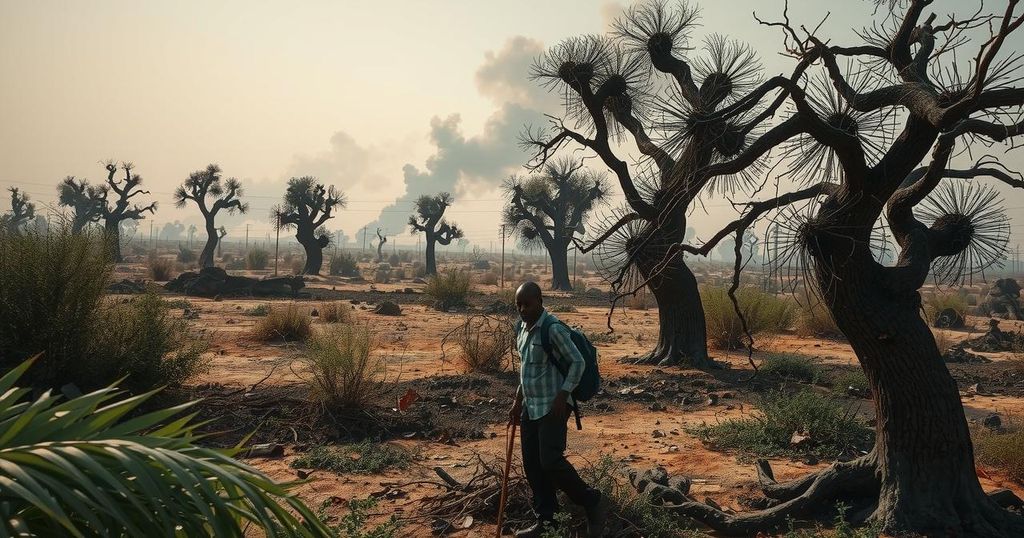Global news
AFRICA, CIVIL WAR, HUMANITARIAN, IO, JUBA, MACH, MACHAR, REFUGEE CRISIS, REFUGEES, RI, RIEK MACHAR, SAL, SOUTH SUDAN, SOUTH SUDANESE ARMY, SPLM, SUDAN, SUDAN PEOPLE ’ S LIBERATION MOVEMENT, SUDAN PEOPLE ’ S LIBERATION MOVEMENT IN OPPOSITION, UPPER NILE, WHITE NILE
Isaac Bennett
0 Comments
Rising Tensions in South Sudan: The Fragility of the 2018 Peace Agreement
Tensions between South Sudan’s President Salva Kiir and Vice President Riek Machar have resurged, prompting high-profile arrests and army mobilization amid fears that the 2018 peace agreement is at risk. A history of conflict influenced by ethnic divisions continues to threaten political stability. The international community and humanitarian organizations express concern over ongoing violence and the need for dialogue to address South Sudan’s multifaceted crises, including severe food shortages.
Recent tensions between South Sudan’s President Salva Kiir and Vice President Riek Machar have escalated, leading to high-level arrests and army mobilization. Following troubling incidents, such as soldiers surrounding Machar’s residence, there are concerns that the peace established by the 2018 agreement is at risk due to escalating conflicts, particularly surrounding violence in Upper Nile and a potential disarmament process. South Sudan, despite its oil wealth, faces a severe humanitarian crisis and continues to struggle with widespread poverty.
The history of conflict in South Sudan began shortly after its independence in 2011, when political tensions within the ruling Sudan People’s Liberation Movement (SPLM) fractured the nation along ethnic lines. A civil war erupted in 2013 after Kiir dismissed Machar, leading to the establishment of rebel factions aligned with differing ethnic groups. This conflict resulted in significant casualties and displacement, ultimately culminating in the Revitalised Agreement on Resolution of the Conflict in South Sudan (R-ARCSS) in 2018, which aimed to unify armed factions and enable political transition, though has faced numerous challenges.
The recent resurgence of tensions stems from violent confrontations attributed to an armed militia in Upper Nile, allegedly triggered by a government disarmament initiative. Reports indicated that at least five civilians died in the clashes, raising alarms over the government’s approach, where Blame has shifted among local groups. South Sudan’s Information Minister pointed fingers at the White Army militia for instigating the conflict.
Significant political maneuvers occurred this week when Kiir ordered the arrest of key supporters of Machar, consolidating control over the narrative and power. Prominent figures including military generals and ministers were detained, prompting leaders from the SPLM/IO to voice deep concerns over trust and the risk posed to the peace agreement as a result of these actions. Political stability is further hindered by continued delays in implementing essential reforms outlined in the peace deal.
Responses from the international community encapsulate widespread concern. Kenyan President William Ruto’s appeal for dialogue between Kiir and Machar echoes a joint statement from various embassies urging immediate cessation of hostilities and restraint. Observers fear ongoing political strife combined with humanitarian challenges may jeopardize security arrangements crucial to the country’s stability. Activist Mohammed Akot noted both SPLM factions must show genuine commitment to peace or risk provoking further conflict, emphasizing the vital need for cooperation in a nation already beset by crises.
In light of the financial realities affecting humanitarian efforts, organizations like the World Food Programme anticipate significant shortfalls in resources to assist millions facing severe food scarcity, underscoring an urgent need for corrective measures to address the plight of the South Sudanese populace. As ongoing disputes threaten existing agreements, it becomes increasingly imperative for political leaders to foster reconciliation and stabilize the region.
The current spike in tensions between South Sudan’s leaders poses a direct threat to the 2018 peace agreement, previously hailed as a turning point for stability. The arrests made by President Kiir and increasing violence in Upper Nile signify potential backtracking in efforts to unify the nation and address pressing humanitarian needs. Political observers stress that without renewed commitment from both sides, the risk of further conflict persists, threatening the overall stability and prosperity of South Sudan. The international community remains vigilant, urging immediate dialogue and cessation of hostilities, while humanitarian organizations indicated a dire need for sustained support to alleviate the crisis affecting millions of citizens. Immediate actions are required to prevent a collapse of trust and governance in South Sudan.
Original Source: www.aljazeera.com




Post Comment